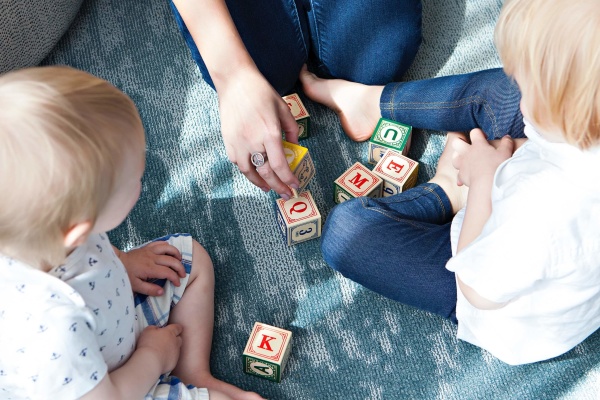
4 Skills to Teach Your Child in the Digital Age
As we progress through the digital age, the world we live in is quickly changing. With so much uncertainty, it’s hard to predict how the education system and workforce will look in the next ten years. All this uncertainty may be worrisome to a parent.
In this article we discuss 4 foundational skills that can help prepare your child to thrive in the digital landscape.
Independence
Young blond girl looking up in nature
Ever forget a name of a book, movie, or song and instead of trying to remember it yourself – you immediately Google it? We are all guilty.
Typing in “90s movie about two dogs and cat looking for home” will get you the answer you’re looking for, but this habit is actually pretty harmful.
The more we rely on our smartphones to recall things we have forgotten, the more we become dependent on technology for answers to problems we would otherwise have to solve ourselves.
It’s unsettling to watch your child trying to remember even the most basic of facts, only to reach for their smartphone almost immediately. The more this pattern is repeated the more the brain rewires itself to rely on the internet answers. Our brain likes being efficient and Googling is very efficient.
Internet reliance can have negative impacts on a child’s brain when their minds are the most malleable. Even 10 years ago there were already claims the internet is making our children dumber.[1]
It will be beneficial to your child’s development to do activities that force them to remember things without the use of technology. Memory games stimulate the mind and books like “Moonwalking with Einstein: the Art and Science of Remembering Everything” teach you how to make improving memory a more fun activity.
Skepticism
A happy young boy sitting on a bench top with an open book
With everything we see happening in the world today, it’s important to teach your children that things posted online should be taken with a healthy dose of skepticism.
With the never ending fake news accusations, Russian bots, election meddling, radicalization, and echo chambers, it’s easy to see the internet is quickly being overrun by misinformation and stories specially designed to mislead or deliberately misinform.
So how do you keep your child from being bamboozled? In order to look through the deceit, teach them to analyze the content and determine if it sounds too good (or bad), fantastical, or just downright crazy to be true.
Often articles can be easily debunked if you use enough common sense to see through them. Other times there’s some truth in these stories, but they come with a heaping load of bias.
It’s not fun to always be suspicious, but being skeptical is a key part of critical thinking. It’s generally a pretty good idea to fact-check an article before making any judgments or sharing it on social media. Find some examples of fake stories and practice debunking them with your child. It’s educational, good practice, and usually pretty entertaining.
Empathy
Young woman holding a bird
Possibly the most important characteristic you should help foster in your child is empathy for others. We all have heard and possibly experienced the impact that bullying can have on a child’s life. Although this issue is not a new one, the effects of it are more severe.
With the popularity of smartphones and social media, it has become easier for someone to comment on the life of another person without directly witnessing how it affects the other. Not only does it allow us to say things we would have otherwise filtered out had the person been standing in front of us, it also allows us to do it at any time.
In the past, a child would endure bullying during school, but then they would be able to retreat to the safety of their homes. With social media and smartphones, that sanctuary of the home has been breached. We are constantly connected to each other, creating a potentially endless cycle of bullying.
The ability to put ourselves in another’s shoes is needed to encourage a healthy online community. Teach your child that behind every online avatar there is a real person with real emotions. Whatever they say will be read or heard, and can potentially hurt that individual.
Talk with your child about proper online etiquette. It won’t be easy to pick out whether or not your child is participating in cyberbullying. So pay attention to how they behave after being on their smartphone.
Look for sneaky or evasive behavior when you ask them what they are up to online. Good indicators of a child participating in cyberbullying are behavior changes when online, habitual smartphone use, and multiple accounts on their social networks.
Talk with your child about stories of cyberbullying and its consequences. They may roll their eyes, but it’s important for them to realize that online actions can have real-world consequences.
Although there are steps you can take to teach empathy to your child, keeping them safe when on the receiving end of cyberbullying is another animal altogether.
Dexterity
An adult showing two toddlers how to play with blocks
From the day we’re born, we begin to discover the world through our senses. Watch a child and it’s clear how much they explore new places by way of touch. Through this exploration they begin to develop their fine motor skills which helps them complete tasks such as feeding themselves, tying their shoes, and zipping up their jackets.
A scary trend teachers are now reporting: children are coming into school without the dexterity skills and finger strength needed to properly use a pencil.[2]
When giving a child a smartphone (the pacifier of the 21st century) or tablet to play, technology is cutting into the time they would otherwise be using to do muscle-building activities such as playing with blocks, drawing, climbing trees, or running around outside.
The sedentary lifestyles children now live, thanks to the early introduction of technology into their lives, is leading to underdeveloped hand strength and skills they need to hold and use a pencil.
Make sure your child is developing the skills they’ll need to be successful in early education. Not only should you assure they are getting the recommended 1 hour of activity a day, but encourage them to play games that require developed fine-motor skills and engage their creativity by drawing and creating sculptures with clay. These types of activities will help your child concentrate and build skills they will need later in life.
Where to go from here
Discussing the ways in which to prepare children for their future education (and beyond) will help us draw conclusions on appropriate ways to navigate through the uncertainty of the digital age.
If you have any other ideas for skills to teach children, let us know.
Is there anything you’d like to add, have we missed anything? If you’re interested in sharing your experiences with us or writing a guest post for us, send us an email via hello@mudita.com!
Please feel free to get in touch via social media (send us some photos or videos too), you can find us on Facebook, Twitter and Instagram, let’s connect! To learn more about Mudita, take a look at our website and our other posts.
If you enjoyed reading this article, please share and recommend it!
Related stories

Why sleep is crucial for academic success
Unveiling the Role of Rest in Boosting Brain Power and Well-being

How Screen Time Could Harm Your Preschooler's Development
Discover what modern technology means for the future of our children. Explore the impact of mobile devices on preschoolers' development in this revealing study

7 Simple & Easy Ways to Limit Your Child’s Screen Time
Limiting screen time nurtures a child's mind, allowing creativity and empathy to flourish instead of the weeds of distraction and disconnection.
If you'd like to receive the best stories from our blog, keep up to date with our progress and get notified about our product releases and special discounts.